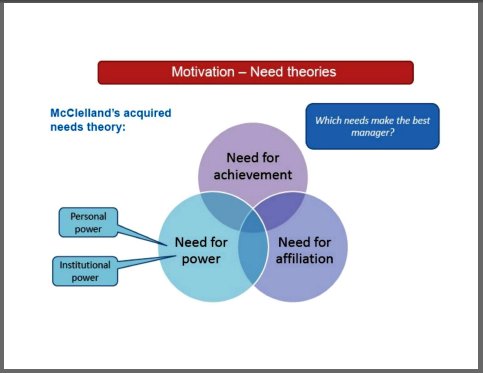|
Acquired Needs TheoryGoal Seeking Achievers
Acquired Needs Theory describes three types of motivational needs: Achievement, Authority and Affiliation. These were first identified and described and by David McClelland in his book “The Achieving Society” [1961]. David McClelland was a pioneer in the field of workplace motivational thinking, and was a proponent of competency-based assessments in favour of IQ and personality based tests.
Achievement motivation [n-ach]The n-ach person is 'achievement motivated' and seeks the achievement and attainment of realistic but challenging goals, and upwards progress in their job. They have strong need for feedback and a feeling of accomplishment. According to David McClelland, people with strong 'achievement motivation' make very good leaders. There weekness is their tendency to expect too much of their staff believing that their staff have the same achievement-focus - but of course most people aren't like this.
Authority/power motivation [n-pow]The n-pow person is 'authority motivated'. This motivational driver produces a need to be influential, effective and to make an impact. These people have a powerful need to lead and take charge and are driven towards enhancing their personal status and prestige. Whilst people with a strong n-pow 'authority-motivation' will work hard work and be commited to the organisation, they may not possess the necessary emotional intelligence and people awareness and thus lack flexibility and the necessary peoplskills.
Affiliation motivation [n-affil]The n-affil person is 'affiliation motivated' and is a team player motivated by a need to be liked and for friendly relationships and interactions with others. David Mcclelland suggested that a a manager's objectivity is underminded by a strong n-affil 'affiliation-motivation' because of the desire to be popular affects and interferes with the decision-making capability of a manager. He suggested that most of us possess and demonstrate a combination of these characteristics, and some some of us show a a strong bias to a particular motivational need that will inevitably influence and affect our working behaviour and management style.
Acquired needs theory focuses on those with an achievement motivation, and David Mclelland stated as a result of his experiments and research that: (1) Most people do not possess a strong achievement-based motivation (2) Those people who do, display a consistent behaviour in setting goals. Acquired needs theory indicates the following characteristics and attitudes of achievement-motivated people:
Acquired needs theory indicates that people with a strong need for achievement , make the best leaders – provided they develop the people skills necessary to get the best results from their people. This achievement motivation is also related to Herzberg's motivation hygiene theory.
Practical Application of Acquired Needs Theory to change leadership and managementIn my view, there are 2 main applications of acquired needs theory: (1) Most people don't think like us It may seem an obvious point, and yet I have often heard CEOs and directors complaining that their managers "just dont get it". But it is up to the change leader and his managers to define and communicate those actionable steps, and to manage people through the process of implementing and integrating those steps as the new modus operandi. (2) Identify and work with the achievers in your team The second application of acquired needs theory is to find the people who are achievement oriented and who have the necessary people skills - they may not always be in the obvious roles - and forge them into a small team to help lead and manage your change initiative. Use the informal networks as well. To quote Jon Katzenback: "find the master motivators" - the people who are recognised by their peers as being natural leaders.
Further Resources
Motivation in the workplace - People are motivated when they are inspired Maslow's hierarchy of needs - A paradigm shift ERG Theory - Practical application to leading change Herzberg Motivation Theory - Satisfied and motivated Process theories of motivation - Personal needs drive behaviour Employee motivation techniques - How to achieve peak performance Myers Briggs Personality Types - Why so importantInspirational motivation - How to inspire your people in tough times
|





